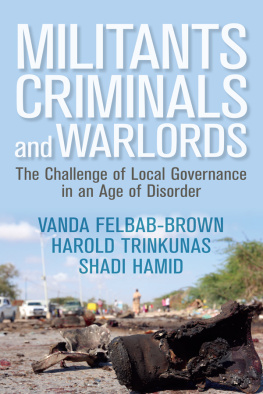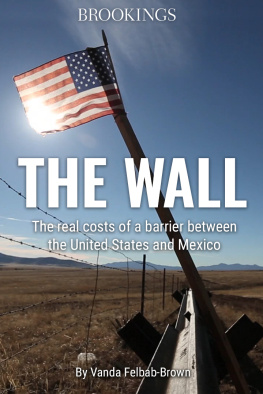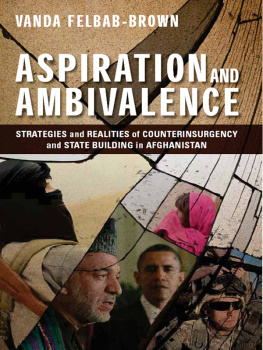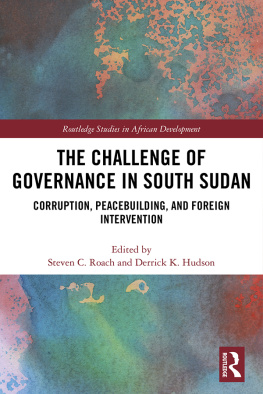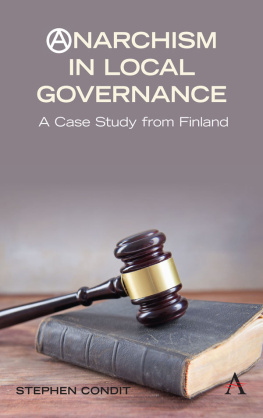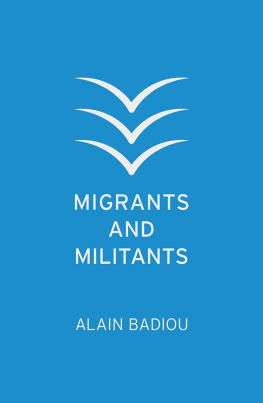GEOPOLITICS IN THE 21ST CENTURY
For a quarter century since the fall of the Berlin Wall, the world has enjoyed an era of deepening global interdependence, characterized by the absence of the threat of great power war, spreading democracy, and declining levels of conflict and poverty. Now, much of that is at risk as the regional order in the Middle East unravels, the security architecture in Europe is again under threat, and great power tensions loom in Asia.
The Geopolitics in the 21st Century series, published under the auspices of the Order from Chaos project at Brookings, will analyze the major dynamics at play and offer ideas and strategies to guide critical countries and key leaders on how they should act to preserve and renovate the established international order to secure peace and prosperity for another generation.
MILITANTS, CRIMINALS,WARLORDS
THE CHALLENGE OF LOCAL GOVERNANCE IN AN AGE OF DISORDER
VANDA FELBAB-BROWN
HAROLD TRINKUNAS
SHADI HAMID
Brookings Institution Press
Washington, D.C.
Copyright 2018
THE BROOKINGS INSTITUTION
1775 Massachusetts Avenue, N.W., Washington, D.C. 20036
www.brookings.edu
All rights reserved. No part of this publication may be reproduced or transmitted in any form or by any means without permission in writing from the Brookings Institution Press.
The Brookings Institution is a private nonprofit organization devoted to research, education, and publication on important issues of domestic and foreign policy. Its principal purpose is to bring the highest quality independent research and analysis to bear on current and emerging policy problems. Interpretations or conclusions in Brookings publications should be understood to be solely those of the authors.
Library of Congress Cataloging-in-Publication data are available.
ISBN 978-0-8157-3189-4 (cloth : alk. paper)
ISBN 978-0-8157-3190-0 (ebook)
9 8 7 6 5 4 3 2 1
Typeset in Sabon and Scala Sans
Composition by Westchester Publishing Services
Contents
Acknowledgments
THIS BOOK IS INFORMED by the findings of over two years of discussion by the members of the Brookings Seminar on Reconstituting Local Orders. We are grateful to all those who participated in the Brookings Seminar, particularly those who contributed working papers: Pavol Kosn, Andrew Lebovich, Benjamin Lessing, Cameron Munter, Matthew Nelson, and Manzar Zaidi. Reflecting on the findings of their deeply informed research and keen insights helped us greatly as we wrote this book.
We are especially grateful to our colleagues Bruce Jones, vice president and director of the Foreign Policy program at Brookings; Michael OHanlon, director of research in the Foreign Policy program at Brookings; and Charles Chuck T. Call, associate professor at American University and nonresident senior fellow in the Latin America Initiative at Brookings. Their close reading of draft chapters and their suggestions helped to improve the book considerably.
We are also grateful for our discussions on local governance with our colleagues Enrique Desmond Arias at George Mason University and Javier Osorio at City University of New York. Together, we are engaged in a longer-term project to understand the micro-foundations and micro-dynamics of armed nonstate actor participation in local governance processes using a nested mixed-methods approach. Our work together has influenced our thinking on the intellectual framework used in this book.
This book would not have been possible without the support of our junior colleagues at Brookings and at Stanford. We want to particularly recognize the hard work of Rashid Dar, Caitlyn Davis, Emily Katz, Ashley Miller, and Bradley Porter.
Support for this publication, part of the Order from Chaos project, was generously provided by the Brookings Foreign Policy Directors Strategic Initiatives Fund. In addition, the authors would like to recognize the support of Danny Abraham, Jonathan Colby, Ben Jacobs, Ned Lamont, and Haim Saban. Brookings recognizes that the value it provides to any supporter lies in absolute commitment to quality, independence, and impact. Activities supported by its donors reflect this commitment, and the analysis and recommendations of the Institutions scholars are not determined by any donation. Harold Trinkunas would also like to thank the Center for International Security and Cooperation at Stanford University for its support during the writing of this book.
Finally, we would like to thank the anonymous peer reviewers for their deep reading and insightful comments on an earlier draft of the book manuscript. Responding to their critiques made the final product stronger. The views expressed in this book and any remaining errors are those of the authors alone.
CHAPTER ONE
Local Orders in an Age of International Disorder
WE LIVE IN AN AGE OF DISORDER. Yet the strife and wars that we witness every day are not primarily the product of international conflict, as might have traditionally been the case in previous centuries, but rather in large part the product of a breakdown in domestic institutions in a number of important states. Long-term institutional weaknesses persist in a large number of developing countries, and even well-developed countries contain functional gaps and holes in their governance structures. Around the globe the politics of identity, ideology, and religion further contribute to disorder by producing highly polarized societies and deepening conflicts among nonstate actors as well as between nonstate actors and the state.
In the Middle East, the Arab Spring disrupted long calcified political systems in ways that are still producing unpredictable effects not just on the regional order, but also on great power politics, and even on the future of the European project. The collapse of political order in Libya has had wide-ranging consequences for governance across the Sahel, exacerbating Mali and Nigerias fragility. Meanwhile, Russias annexation of Crimea was facilitated by a breakdown of political order in Ukraine, and Russias aggressive external posture partially reflects and compensates for its internal weaknesses. In a growing number of countries, including long-established democracies, fear of refugees and migrantsthemselves the product of disorderis contributing to the resurgence of populist nationalism. Even emerging powers such as India and Brazil face profound and persistent governance problems, including those posed by criminal organizations that take advantage of gaps in public safety and the rule of law.
Of course, the impact of national disorder on the international system is not a new phenomenon. The collapse of parliamentary democracy in Japan in the 1920s and the militarization of its domestic politics that followed sparked an extended conflict across Asia that did not end until well after 1945 with decolonization and the constitution of stable political systems in China, India, Indonesia, Myanmar, and Vietnam. The Cuban Revolution in 1959 set off a string of insurgencies and military coups across Latin America in addition to provoking some of the most serious confrontations between the superpowers during the Cold War. A stable new order only emerged following the re-democratization of the region in the 1980s. Whether it is a product of contagion or the emergence of revanchist local actors with international ambitions, disorder within states has repeatedly affected the shape of regional orders and accelerated international conflict. In short, what happens within states matters for what happens outside of them.

